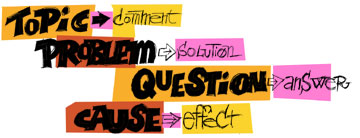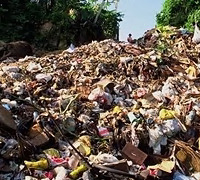
In this unit you will review the following points:
- Text organisation
- Problem and solution language
- To + infinitive
- For + -ing vs. to + infinitive
- The -ing form
- Useful vocabulary: The environment

1. Text organisation.
TIP:
Giving your writing text a clear structure will help you to write it quickly and will also make it easier to read and understand. There are many ways to organise a text, depending on the topic and content. Common patterns are:
topic – comment
problem – solution
question – answer
cause – effect
Match the patterns to the examples.
2. Text organisation.
In a longer text it is very common to find a combination of the approaches introduced in the previous exercise. Often each paragraph fulfils a different, specific function.
Read the question and the sample answer. Which function does each paragraph of the sample answer fulfil?
Writing Task 2
You should spend about 40 minutes on this task.
Write about the following topic:
People are producing more and more rubbish. What is causing this increase? What are the effects? How can we solve this problem?
Give reasons for your answer and include any relevant examples from your own knowledge or experience.
Write at least 250 words.

3. Problem and solution language.
Choose the correct category for the underlined words and phrases.
If you want, you can see a summary of problem and solution language used in this article.
| Problem |
Option/Solution |
Evaluation of solution |
an increase of nearly 25% on a decade ago
is causing serious environmental and social problems
threaten to
is largely to blame
culprit
There are also environmental concerns
contaminate
damage |
The most common option is
There are several solutions to the rubbish problem
we should reduce the amount we consume
This means not buying things we don't need
Reusing involves
The final option |
this option is rapidly becoming too expensive to be practical
It has also been known to
the least desirable of the three
should be considered only as a last resort |
4. Problem and solution language.
Complete the sentences with the words and phrases.
5. To + infinitive.
Choose the correct example to match to the different uses of to + infinitive.
6. To + infinitive.
Complete the second sentence so that it has the same meaning as the first.
7. To + infinitive as a noun.
Choose the correct option to complete the explanations.
8. To + infinitive as a noun.
Complete the sentences with to + infinitive using the correct verb from the box.
| bury |
make |
invite |
recycle |
| reduce |
separate |
teach |
try |
9. For or to?
For + -ing is used to describe what something is used for; it answers the question "What ... for?" We also use for with a noun.
Use old envelopes for writing lists.
This box is for plastic rubbish that we can recycle.
To + infinitive is used to describe a purpose; it answers the question "Why ...?" It is also commonly used when the subject of the clause is a person, or with a passive where the agent is a person.
Return bottles to the factory to be cleaned and refilled.
We use old glass bottles to put flowers in.
New goods are designed to last just a short time.
Complete the sentences with the correct option.
10. The -ing form.
Choose the correct option to complete the explanation that goes with each example.
11. The -ing form.
Put the words in order to complete the sentences.
12. Infinitive or -ing?
Choose the correct option to complete the text.
13. Practice question.
Read the instructions and write your answer. Remember to:
- divide your arguments into causes, effects and solutions.
- use for + -ing and to + infinitive to express reasons and uses.
- use the -ing form appropriately.
Writing Task 2
You should spend about 40 minutes on this task.
Write about the following topic:
In many parts of the world, natural resources such as forests, rivers and plants are being destroyed. What is causing this destruction? What are the effects? How can we solve this problem?
Discuss the issue with reference to a single resource.
Give reasons for your answer and include any relevant examples from your own knowledge or experience.
Write at least 250 words.
When you have completed the writing task, you can look at a sample answer. Compare the sample answer with your own.


